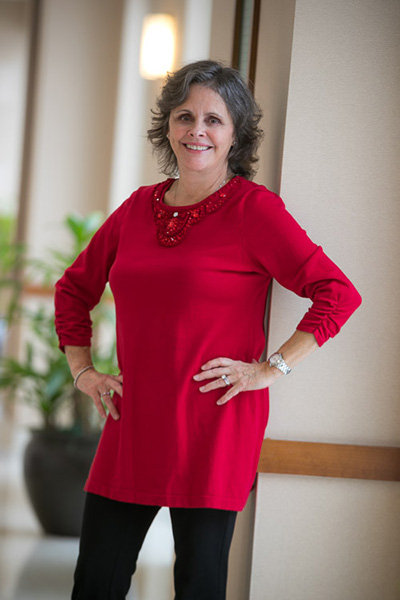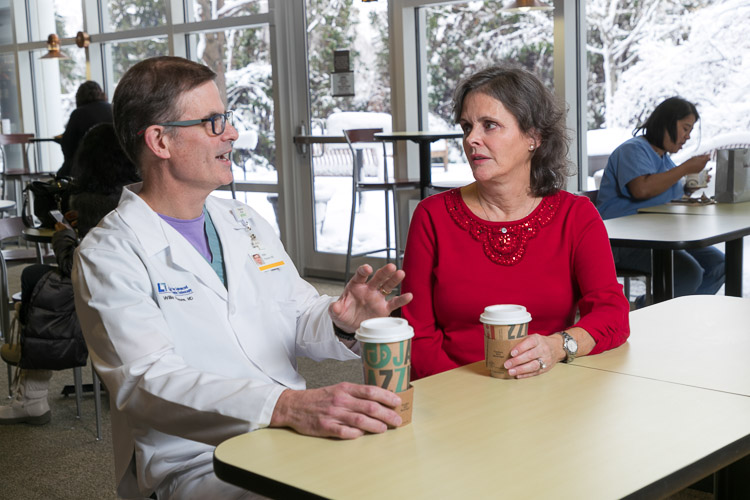GERD gone, thanks to TIF procedure
December 21, 2018

Coffee lover freed from raspy throat and heartburn
Usually heartburn is the key symptom of GERD (gastroesophageal reflux disease), a common digestive disorder that results in acid reflux and affects about 30 percent of Americans. But Nancy L., a 63-year-old retired Barrington resident started out with a strange symptom. She kept losing her voice.
“I thought it was something with my throat,” Nancy recalls.
After visiting an ENT who then sent her to an internist, she learned she had GERD.
“He put me on a PPI, a proton pump inhibitor,” Nancy recalls.
That worked for a while, but after two years of taking the medication, she became concerned about long-term effects.
“They said I should take calcium every day because being on a PPI long term can increase the risk for developing bone fractures,” Nancy says.
After conducting further research, Nancy learned about other potential side effects of taking PPI’s for many years, like kidney problems and dementia. That was enough for her to attend a seminar on solutions for getting rid of GERD led by Willis Parsons, M.D., Medical Director of the NCH Gastroenterology Center.
“I went to the seminar and heard about two procedures they can do for GERD – TIF (transoral incisionless fundoplication) and LINX,” Nancy says.
“The next day I called Dr. Parsons’ office to make an appointment to see what I needed to do.”
Nancy underwent tests and qualified for the TIF procedure, a non-surgical option that is performed from inside the patient’s stomach without incisions.
“Patients undergo extensive testing with imaging and endoscopic evaluation to determine whether they are good candidates for a TIF procedure,” Dr. Parsons explains. “We also utilize a multidisciplinary approach to review data once testing is completed, and we collaboratively decide if a patient would be an appropriate candidate for any of our anti-reflux surgeries.”
About 80 percent of TIF patients can discontinue medication for acid reflux, Dr. Parsons says, adding that the procedure has been offered at NCH for over two years.
Cold feet
Nancy thought TIF sounded great, but she got a little scared and decided to put off the procedure. But bloodwork done at NCH in June 2017 showed acute kidney injury. Her primary care doctor suspected this was caused by being on a PPI for too long.
“In a matter of months, my kidney function had gone from 96 to 56,” she says. “That’s a significant decrease.”
She immediately went off the medication and scheduled the procedure. After 30 days of not taking the PPI, bloodwork revealed that her kidney function had returned to normal. But her heartburn was in her throat, her voice was raspy and everything she ate caused pain and discomfort.
“All I was eating was chicken, white bread and water,” she says. “Everything I swallowed was hurting me.”
How TIF works
The procedure repairs the enlarged opening in the diaphragm, restores the angle of the esophagus and increases the pressure of the lower esophageal sphincter to prevent reflux. Compared to traditional surgery, there are no incisions, fewer complications and faster recovery.
Nancy stayed overnight in the hospital and was released the next morning. She took a PPI for several days to give her esophagus time to heal and then ate a limited diet for the first two months.

Cup of joe
Today, Nancy is back to drinking coffee again, one of her favorite beverages.
“I’ve always been a person who has one cup of coffee a day, but I couldn’t do that after coming off the PPI,” Nancy says.
Since the TIF procedure in September 2017, she’s gone off all medication and reports she can safely and confidently eat any foods, including chocolate and Italian cuisine, without acid reflux.
“I haven’t found a food yet that I cannot eat,” she says.
Nancy says she tries to use NCH for all of her healthcare needs, noting that she was led to Dr. Parsons because he was well known and has a great reputation.
“There are great doctors on staff at NCH,” Nancy says. “It’s important to me that a local hospital attracts good doctors.”
Learn more about testing and procedures for GERD at nch.org/refluxrelief.
No case is the same, results may vary.